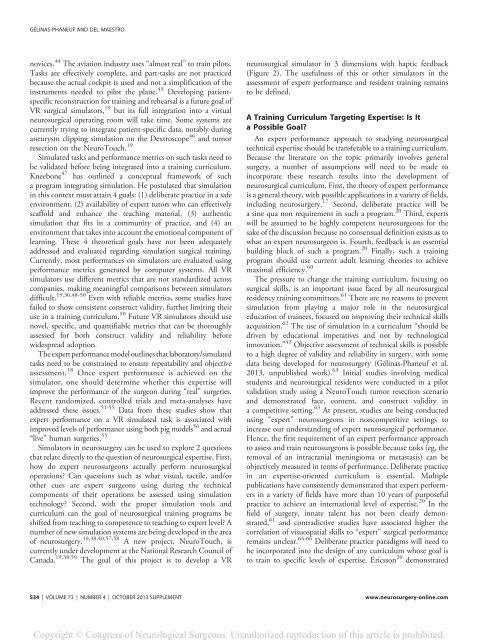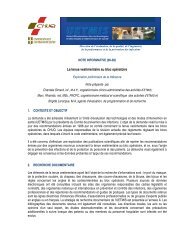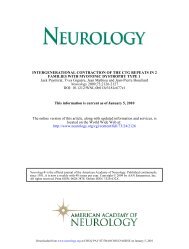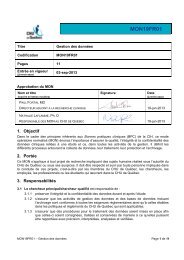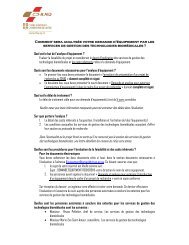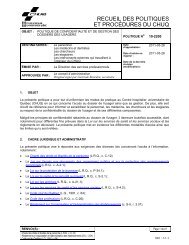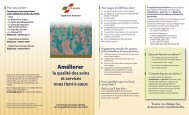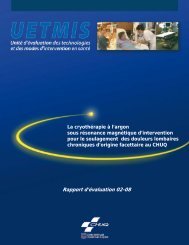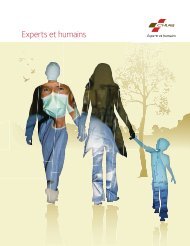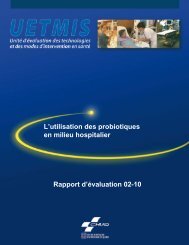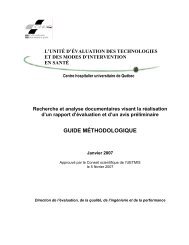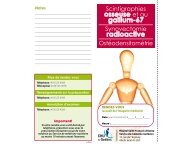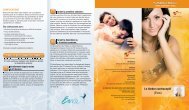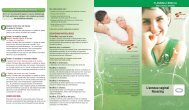Surgical Expertise in Neurosurgery: Integrating Theory Into ... - CHUQ
Surgical Expertise in Neurosurgery: Integrating Theory Into ... - CHUQ
Surgical Expertise in Neurosurgery: Integrating Theory Into ... - CHUQ
Create successful ePaper yourself
Turn your PDF publications into a flip-book with our unique Google optimized e-Paper software.
Copyright © Congress of Neurological Surgeons. Unauthorized reproduction of this article is prohibited.GÉLINAS-PHANEUF AND DEL MAESTROnovices. 44 The aviation <strong>in</strong>dustry uses “almost real” to tra<strong>in</strong> pilots.Tasks are effectively complete, and part-tasks are not practicedbecause the actual cockpit is used and not a simplification of the<strong>in</strong>struments needed to pilot the plane. 45 Develop<strong>in</strong>g patientspecificreconstruction for tra<strong>in</strong><strong>in</strong>g and rehearsal is a future goal ofVR surgical simulators, 19 but its full <strong>in</strong>tegration <strong>in</strong>to a virtualneurosurgical operat<strong>in</strong>g room will take time. Some systems arecurrently try<strong>in</strong>g to <strong>in</strong>tegrate patient-specific data, notably dur<strong>in</strong>ganeurysm clipp<strong>in</strong>g simulation on the Dextroscope 46 and tumorresection on the NeuroTouch. 19Simulated tasks and performance metrics on such tasks need tobe validated before be<strong>in</strong>g <strong>in</strong>tegrated <strong>in</strong>to a tra<strong>in</strong><strong>in</strong>g curriculum.Kneebone 47 has outl<strong>in</strong>ed a conceptual framework of sucha program <strong>in</strong>tegrat<strong>in</strong>g simulation. He postulated that simulation<strong>in</strong> this context must atta<strong>in</strong> 4 goals: (1) deliberate practice <strong>in</strong> a safeenvironment, (2) availability of expert tutors who can effectivelyscaffold and enhance the teach<strong>in</strong>g material, (3) authenticsimulation that fits <strong>in</strong> a community of practice, and (4) anenvironment that takes <strong>in</strong>to account the emotional component oflearn<strong>in</strong>g. These 4 theoretical goals have not been adequatelyaddressed and evaluated regard<strong>in</strong>g simulation surgical tra<strong>in</strong><strong>in</strong>g.Currently, most performances on simulators are evaluated us<strong>in</strong>gperformance metrics generated by computer systems. All VRsimulators use different metrics that are not standardized acrosscompanies, mak<strong>in</strong>g mean<strong>in</strong>gful comparisons between simulatorsdifficult. 19,36,48-50 Even with reliable metrics, some studies havefailed to show consistent construct validity, further limit<strong>in</strong>g theiruse <strong>in</strong> a tra<strong>in</strong><strong>in</strong>g curriculum. 50 Future VR simulators should usenovel, specific, and quantifiable metrics that can be thoroughlyassessed for both construct validity and reliability beforewidespread adoption.The expert performance model outl<strong>in</strong>es that laboratory/simulatedtasks need to be constra<strong>in</strong>ed to ensure repeatability and objectiveassessment. 18 Once expert performance is achieved on thesimulator, one should determ<strong>in</strong>e whether this expertise willimprove the performance of the surgeon dur<strong>in</strong>g “real” surgeries.Recent randomized, controlled trials and meta-analyses haveaddressed these issues. 51-55 Data from these studies show thatexpert performance on a VR simulated task is associated withimproved levels of performance us<strong>in</strong>g both pig models 56 and actual“live” human surgeries. 55Simulators <strong>in</strong> neurosurgery can be used to explore 2 questionsthat relate directly to the question of neurosurgical expertise. First,how do expert neurosurgeons actually perform neurosurgicaloperations? Can questions such as what visual, tactile, and/orother cues are expert surgeons us<strong>in</strong>g dur<strong>in</strong>g the technicalcomponents of their operations be assessed us<strong>in</strong>g simulationtechnology? Second, with the proper simulation tools andcurriculum can the goal of neurosurgical tra<strong>in</strong><strong>in</strong>g programs beshifted from teach<strong>in</strong>g to competence to teach<strong>in</strong>g to expert level? Anumber of new simulation systems are be<strong>in</strong>g developed <strong>in</strong> the areaof neurosurgery. 19,38,40,57,58 A new project, NeuroTouch, iscurrently under development at the National Research Council ofCanada. 19,38,59 The goal of this project is to develop a VRneurosurgical simulator <strong>in</strong> 3 dimensions with haptic feedback(Figure 2). The usefulness of this or other simulators <strong>in</strong> theassessment of expert performance and resident tra<strong>in</strong><strong>in</strong>g rema<strong>in</strong>sto be def<strong>in</strong>ed.A Tra<strong>in</strong><strong>in</strong>g Curriculum Target<strong>in</strong>g <strong>Expertise</strong>: Is Ita Possible Goal?An expert performance approach to study<strong>in</strong>g neurosurgicaltechnical expertise should be transferable to a tra<strong>in</strong><strong>in</strong>g curriculum.Because the literature on the topic primarily <strong>in</strong>volves generalsurgery, a number of assumptions will need to be made to<strong>in</strong>corporate these research results <strong>in</strong>to the development ofneurosurgical curriculum. First, the theory of expert performanceis a general theory, with possible applications <strong>in</strong> a variety of fields,<strong>in</strong>clud<strong>in</strong>g neurosurgery. 17 Second, deliberate practice will bea s<strong>in</strong>e qua non requirement <strong>in</strong> such a program. 20 Third, expertswill be assumed to be highly competent neurosurgeons for thesake of the discussion because no consensual def<strong>in</strong>ition exists as towhat an expert neurosurgeon is. Fourth, feedback is an essentialbuild<strong>in</strong>g block of such a program. 20 F<strong>in</strong>ally, such a tra<strong>in</strong><strong>in</strong>gprogram should use current adult learn<strong>in</strong>g theories to achievemaximal efficiency. 60The pressure to change the tra<strong>in</strong><strong>in</strong>g curriculum, focus<strong>in</strong>g onsurgical skills, is an important issue faced by all neurosurgicalresidency tra<strong>in</strong><strong>in</strong>g committees. 61 There are no reasons to preventsimulation from play<strong>in</strong>g a major role <strong>in</strong> the neurosurgicaleducation of tra<strong>in</strong>ees, focused on improv<strong>in</strong>g their technical skillsacquisition. 62 The use of simulation <strong>in</strong> a curriculum “should bedriven by educational imperatives and not by technological<strong>in</strong>novation.” 43 Objective assessment of technical skills is possibleto a high degree of validity and reliability <strong>in</strong> surgery, with somedata be<strong>in</strong>g developed for neurosurgery (Gél<strong>in</strong>as-Phaneuf et al.2013, unpublished work). 63 Initial studies <strong>in</strong>volv<strong>in</strong>g medicalstudents and neurosurgical residents were conducted <strong>in</strong> a pilotvalidation study us<strong>in</strong>g a NeuroTouch tumor resection scenarioand demonstrated face, content, and construct validity <strong>in</strong>a competitive sett<strong>in</strong>g. 63 At present, studies are be<strong>in</strong>g conductedus<strong>in</strong>g “expert” neurosurgeons <strong>in</strong> noncompetitive sett<strong>in</strong>gs to<strong>in</strong>crease our understand<strong>in</strong>g of expert neurosurgical performance.Hence, the first requirement of an expert performance approachto assess and tra<strong>in</strong> neurosurgeons is possible because tasks (eg, theremoval of an <strong>in</strong>tracranial men<strong>in</strong>gioma or metastasis) can beobjectively measured <strong>in</strong> terms of performance. Deliberate practice<strong>in</strong> an expertise-oriented curriculum is essential. Multiplepublications have consistently demonstrated that expert performers<strong>in</strong> a variety of fields have more than 10 years of purposefulpractice to achieve an <strong>in</strong>ternational level of expertise. 20 In thefield of surgery, <strong>in</strong>nate talent has not been clearly demonstrated,61 and contradictive studies have associated higher thecorrelation of visuospatial skills to “expert” surgical performancerema<strong>in</strong>s unclear. 64-66 Deliberate practice paradigms will need tobe <strong>in</strong>corporated <strong>in</strong>to the design of any curriculum whose goal isto tra<strong>in</strong> to specific levels of expertise. Ericsson 20 demonstratedS34 | VOLUME 73 | NUMBER 4 | OCTOBER 2013 SUPPLEMENTwww.neurosurgery-onl<strong>in</strong>e.com


